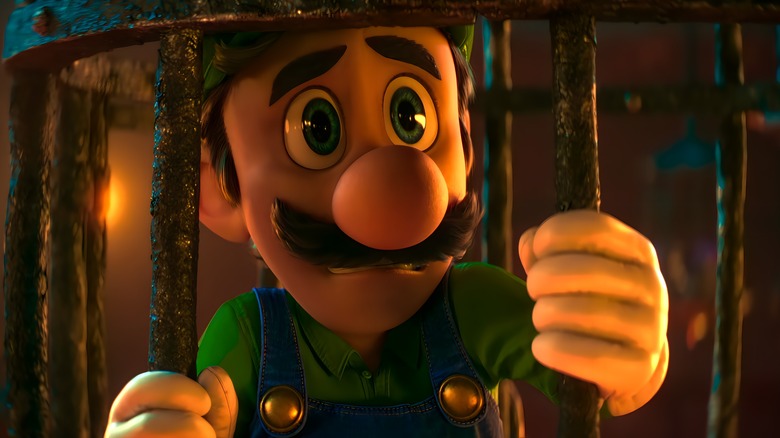Luigi's Ringtone In The Super Mario Bros. Movie Will Give You A Jolt Of Nostalgia
Kids of the early 2000s are likely deeply familiar with the Nintendo GameCube, the console that was released in September of 2001 in Japan (and the following month in North America). The design of the console itself was, and still is, immensely appealing, sporting a pleasant indigo/grey color scheme, and boasting complex, unique controllers that fit easily into the hands. It was also the first Nintendo home console to make use of discs instead of cartridges for its games, allowing the company to remain competitive in a marketplace already dominated by disc-based systems like the Sony Playstation. Weirdly, GameCube discs were of a miniaturized variety, allegedly to help curb piracy after Dreamcast games were pirated to hell and back.
Unfortunately for Nintendo, the GameCube was not one of their more successful pieces of hardware. According to Nintendo's own website, the GameCube only moved 21.74 million units, well below any of their systems to date (the original NES, by comparison, sold 61.91 million units, and the Nintendo 64, while underperforming, still sold 32.93 million). As of this writing, the Nintendo Switch has become the best-selling Nintendo console of all time, while the ill-fated Virtual Boy remains their biggest blunder, selling fewer than one million units in total.
The GameCube's failure may be attributed to the fact that it did not come bundled with a high-profile Mario game; "Super Mario Sunshine" wasn't released until August 2002. Or that its friendly, cartoonish colors relegated it to "toy" status, while other systems were making increasingly complex, violent games.
Regardless, there is a generation of at least 21 million kids who are fond of the thing, and references to GameCube games have penetrated the pop consciousness to such a degree that they appear in the new "The Super Mario Bros. Movie."
Luigi's ringtone is the plinky GameCube startup fanfare.
The scene in question
At the beginning of "The Super Mario Bros. Movie," Mario (Chris Pratt) and Luigi (Charlie Day) are citizens of modern-day Brooklyn, spending their time in the Punch-Out!! Pizzeria, and psyched about their just-launched plumbing business; their TV ad employs the introductory rap from "The Super Mario Bros. Super Show!" (1989). Unproven in the plumbing business, they await their first high-profile job, eager to gain a reputation. While talking to a cruel naysayer in the pizzeria, Mario and Luigi receive their first call. Luigi's ringtone is instantly recognizable.
It's worth noting that the GameCube sound is Luigi's ringtone and not Mario's. Because "Super Mario Sunshine" wasn't part of the GameCube library for nearly a year after its release, the first notable game for the system became "Luigi's Mansion," a Mario-free game about the title character trekking into a haunted house to suck up ghosts into a vacuum cleaner. Because a solo Luigi game was the highest-profile release on the system, at least for its first year of life, many may consider the GameCube to be Luigi's console.
As time has passed, the GameCube has been reassessed, and Escapist Magazine recently listed the GameCube as one of the best of all consoles.
Not all consoles had startup screens. The first Nintendo product to boast such a feature — at least in the United States; Japanese models had startup sounds — was the Game Boy, and that was a mere "b'ding!" sound. Early Atari and Coleco systems had opening screens, as did the Sega Master System and others of its ilk. Such openers became common in the 1990s, and many can likely point to the PlayStation's low buzz as feeling epic and grand.
Does the GameCube have the best startup arpeggio? That will likely depend on your age.

